Is BOTB Haram or Halal in Islam?
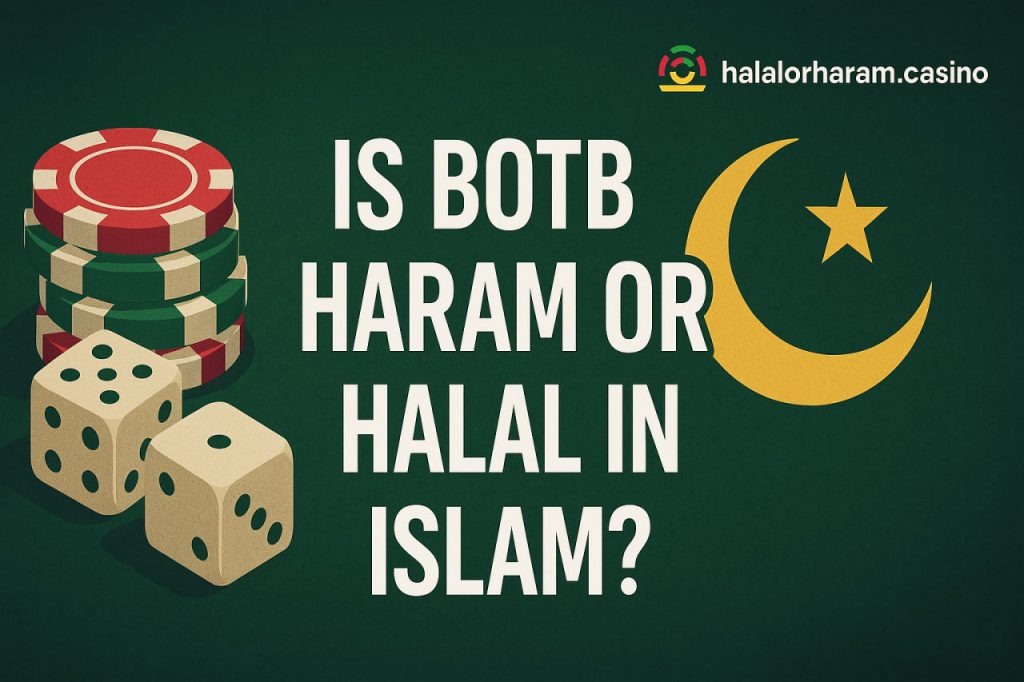
If you’ve ever come across BOTB (Best of the Best), you might be wondering: “Is BOTB Haram or Halal in Islam?” With the platform offering dream car competitions and lifestyle prizes, it’s essential for Muslims to understand whether participation aligns with Islamic teachings. In this in-depth article, we explore the religious implications, examine scholarly views, and analyze core Islamic principles to provide a detailed answer to this frequently asked question.
What is BOTB?
BOTB (Best of the Best) is a UK-based online competition company that has grown in popularity due to its attractive prize offerings. Participants enter competitions to win:
- Dream luxury cars (Lamborghini, Ferrari, Porsche, Tesla, and more)
- High-end electronics (iPhones, MacBooks, gaming setups, etc.)
- Large cash prizes (sometimes up to £500,000)
- Exotic holidays and lifestyle experiences
How Does BOTB Operate?
Here is a step-by-step breakdown of how BOTB works:
- Selecting a Prize: Players choose the prize they want to win from various categories.
- Buying Tickets: Each entry involves purchasing a ticket. Prices vary depending on the prize’s value.
- Spot the Ball Game: Participants are shown a photo of a football match (with the ball removed) and are asked to guess where the ball was.
- Judging Panel Evaluation: A panel of professional judges, including former footballers and referees, selects the winning coordinate.
- Announcing Winners: The participant whose guess is closest to the panel’s coordinate wins the prize. All others lose their entry fee.
This model may appear harmless or skill-based on the surface. However, under Islamic law, certain elements raise serious red flags.
Play Halal-Approved BOTB Selected by Our Team
Our research team has carefully examined BOTB from an Islamic perspective and selected a version that meets our halal criteria. This Shariah-verified option removes the problematic gambling elements found in many prize and contest-style games, so you can participate with peace of mind.
- ✔ Fully reviewed and Shariah-checked BOTB option
- ✔ Structured to avoid conventional gambling and impermissible betting
- ✔ A halal-friendly way for Muslims to enjoy BOTB responsibly
Note: This recommendation is based on our team’s Shariah analysis and is intended for educational purposes only. For personal rulings, please consult a qualified Islamic scholar.
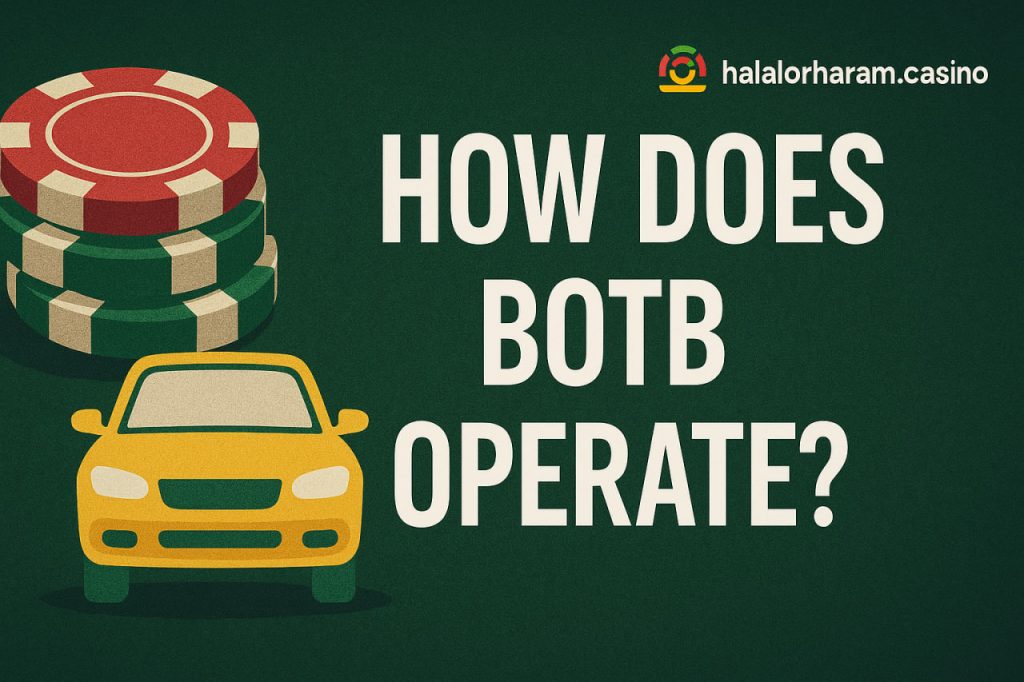
Is BOTB Gambling?
Understanding whether BOTB constitutes gambling is crucial when evaluating its permissibility in Islam. Gambling, or Maisir, is one of the most explicitly forbidden practices in Islamic teachings. It is associated with exploitation, uncertainty, and the shifting of wealth without legitimate exchange or productivity. To determine if BOTB falls into this category, we must dive into Islamic legal definitions and real-world implications.
Gambling in Islamic Context
Gambling is not simply defined by placing a bet or playing cards. In Islam, gambling includes any transaction where a person pays money with the hope of gaining more through uncertain outcomes. The focus is on the unjust enrichment and the element of chance rather than skill.
“They ask you about wine and gambling. Say, ‘In them is great sin and [yet, some] benefit for people. But their sin is greater than their benefit.'” (Qur’an 2:219)
Islamic scholars interpret this to mean that although some gambling systems may offer minor benefits or entertainment, the overall societal and moral harm outweighs any positives.
Key Elements of Gambling in Islam
- Uncertainty (Gharar): The outcome is unpredictable and not guaranteed.
- Unequal Compensation: One party gains while the others lose.
- Lack of Productive Value: No real exchange of goods or services.
- Risk of Harm: Emotional, financial, or societal damage.
- Desire for Quick Gain: Encourages laziness, greed, and false hopes.
Comparing BOTB to Gambling Criteria
BOTB, although disguised as a fun competition, matches most of the above gambling characteristics. Let’s break it down:
| Gambling Element | BOTB Characteristics |
|---|---|
| Requires monetary entry | Yes. Participants pay to submit guesses. |
| Chance determines outcome | Yes. Judging is based on subjective interpretation of the best guess. |
| No guarantee of return | Yes. Only one person wins; all others lose their entry fee. |
| Encourages repeated spending | Yes. Many users repeatedly try in hopes of winning. |
| No real product/service given | Yes. Unlike purchasing a physical good, entry only grants a chance to win. |
| Emotional or financial risk | Yes. Losing entries can lead to addiction, stress, and monetary loss. |
Although BOTB includes a “spot the ball” game, the minimal skill required and the subjective judging make it largely dependent on chance rather than measurable expertise. This is why it is widely viewed as a form of gambling.
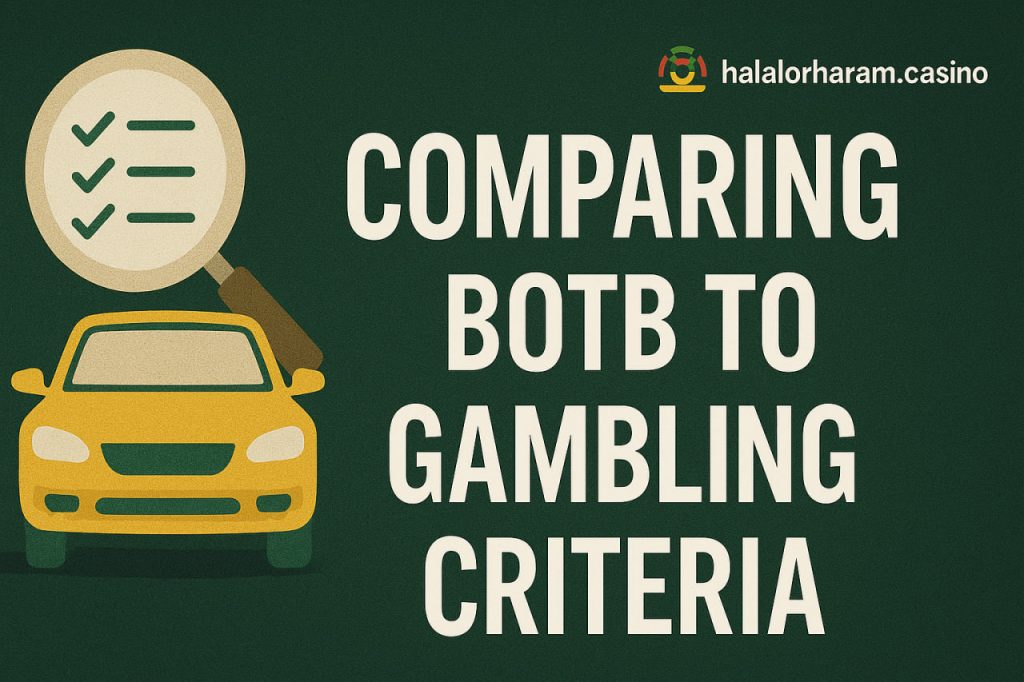
Psychological Impact of Platforms Like BOTB
Beyond legal definitions, Islam also emphasizes protecting one’s mental, emotional, and financial well-being. Games like BOTB:
- Create unrealistic expectations
- Feed impulsive behavior
- Diminish value for hard-earned money
- Lead to discontent with one’s current life or provision (Rizq)
This emotional manipulation aligns BOTB more closely with lotteries and casinos than with ethical, skill-based competitions.
In conclusion, examining the structure and outcomes of BOTB through the lens of Islamic jurisprudence strongly supports the view that BOTB is a form of gambling and thus haram in Islam.?
A central question in determining is BOTB haram or halal in Islam is whether or not the competition is considered gambling (Maisir).
Gambling in Islamic Context
Gambling, or Maisir, is strictly forbidden in Islam. The Qur’an explicitly states:
“O you who have believed, indeed, intoxicants, gambling, [sacrificing on] stone alters [to other than Allah], and divining arrows are but defilement from the work of Satan, so avoid it that you may be successful.” (Qur’an 5:90)
Gambling typically involves:
- Paying money for a chance to win more
- Outcomes dependent on luck or uncertain events
- Potential harm to self or others
- Unequal risk between participants
Analyzing BOTB Against Gambling Criteria
| Element | BOTB Practice | Gambling (Maisir) Criteria |
| Requires payment to enter | Yes | Yes |
| Result based on chance | Yes | Yes |
| Skill-based outcome | Limited | Often minimal |
| Tangible exchange | No | No |
| Winner-takes-all format | Yes | Yes |
| Many participants lose money | Yes | Yes |
Given the above, BOTB meets nearly all the conditions associated with gambling in Islam.
Scholarly Opinions: Is BOTB Halal in Islam?
Islamic scholars and jurists have examined many modern competitions and gaming platforms, including prize draws, raffles, and BOTB-style contests.
Consensus of Most Scholars
The majority of Islamic scholars classify BOTB as haram based on:
- The presence of gharar (excessive uncertainty)
- The inclusion of maisir (gambling)
- A lack of tangible value exchange
Their consensus is grounded in classical Islamic principles and analogies drawn from similar historical transactions that were forbidden.
Minority Opinion
A smaller group suggests that if BOTB involves a high degree of skill and fairness, it might be permissible. However, since BOTB is ultimately judged by a subjective panel and not measurable objective outcomes, this view lacks mainstream support.
Contemporary Fatwas
Several contemporary fatwas have declared paid-entry prize competitions like BOTB impermissible, especially when there is no guaranteed return, and when money is used in a way that resembles gambling.
Why BOTB is Considered Haram
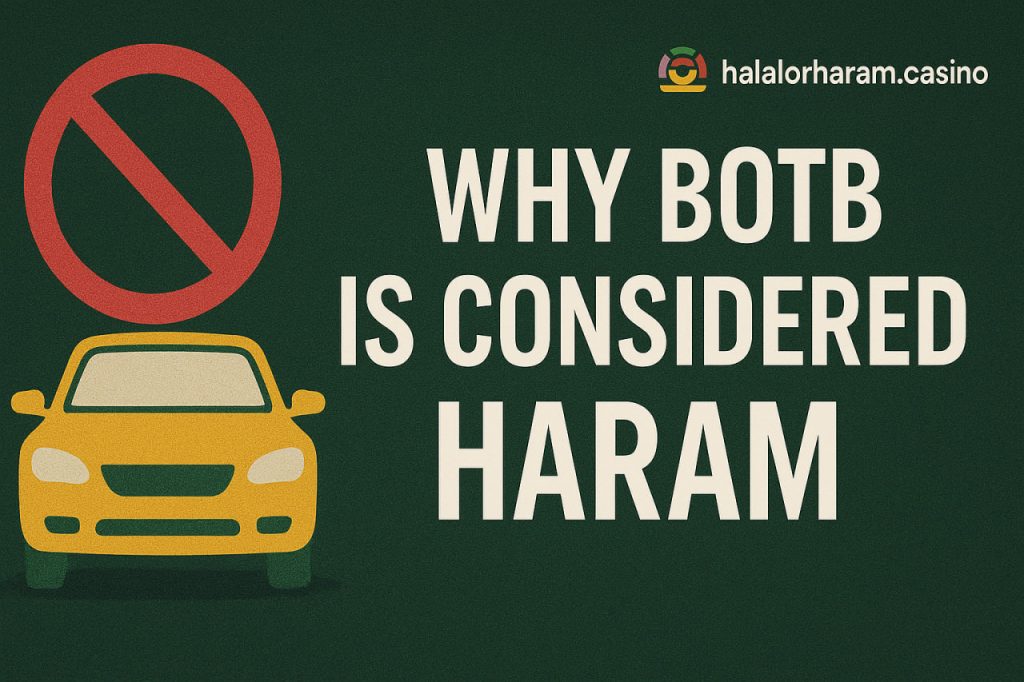
To further clarify “is BOTB haram in Islam”, here are key reasons scholars and Islamic jurists provide:
1. Risk Without Reward
In Islam, transactions must involve mutual benefit. BOTB takes money from participants with no guaranteed return.
2. Excessive Gharar (Uncertainty)
The final outcome depends on a panel’s judgment rather than objective skill, leading to unpredictable and unverifiable results.
3. Illusion of Skill
Though marketed as a skill-based contest, many argue that guessing the position of an edited ball image is no more skillful than spinning a roulette wheel.
4. Encouragement of Materialism and Greed
BOTB advertisements heavily focus on luxurious rewards, fueling desires for wealth and materialism, which goes against Islamic values of humility and moderation.
5. Social Harm and Financial Loss
Many participants repeatedly spend money without winning, leading to potential debt, addiction, or financial distress.
6. No Legitimate Product or Service
Unlike halal businesses, there is no product delivered or value added for the entry fee paid.
What Makes a Contest Halal in Islam?
To be halal, any form of competition or contest must meet these Islamic legal and ethical guidelines:
- Free of Riba (Interest): No element of interest-based gain
- No Gharar: Outcomes must be clear, measurable, and not based on excessive uncertainty
- Ethical Conduct: Must not exploit participants or encourage unethical behavior
- Fair Exchange: All parties must gain something of fair value
- No Element of Gambling: The transaction must not resemble any form of betting or speculation
BOTB violates these principles due to its structure, marketing model, and transactional mechanism.
Halal Alternatives to BOTB
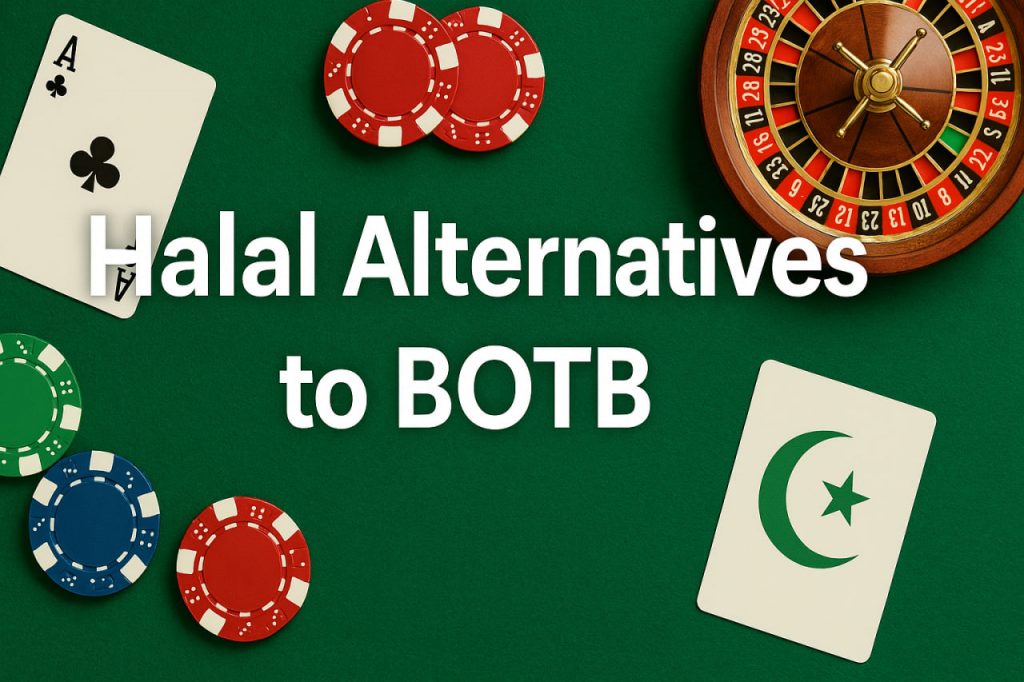
Muslims seeking halal entertainment or competition should look for platforms that align with Islamic values. Here are safer alternatives:
1. Free-to-Enter Prize Competitions
These contests do not charge entry fees, removing the financial risk and gambling-like elements.
2. Skill-Based Contests
Examples include writing contests, coding hackathons, chess tournaments, and sports competitions where winners are decided purely by measurable skill.
3. Halal Business Ventures
Invest your money in businesses or Shariah-compliant startups where your money helps grow a service or product.
4. Charity Lotteries with No Entry Fee
Some Islamic organizations run giveaways for donors or volunteers without charging for entry.
5. Islamic Educational Competitions
Quran memorization contests, Islamic quiz challenges, and scholarly debates provide spiritual and ethical engagement.
Final Verdict
Summary Table
| Criteria | BOTB Status |
| Involves Gambling (Maisir) | Yes |
| Contains Gharar (Uncertainty) | Yes |
| Requires Payment to Participate | Yes |
| Mutual Benefit for Participants | No |
| Complies with Halal Business Ethics | No |
Conclusion
So, is BOTB halal in Islam? After careful analysis and consideration of Islamic rulings, the answer is clear: BOTB is haram. Despite its presentation as a game of skill or entertainment, it mimics gambling in structure, promotes risky financial behavior, and lacks ethical value exchange.
Muslims are advised to avoid BOTB and similar platforms and instead seek out halal forms of engagement, competition, and business. Aligning one’s lifestyle with Islamic values not only ensures religious integrity but also fosters healthier, more meaningful pursuits.
Frequently Asked Questions
Yes, BOTB includes all major elements of gambling: monetary risk, chance-based outcome, and lack of fair exchange.
No, BOTB is not halal in Islam. It is widely considered haram by scholars due to its gambling-like structure.
Islam does not allow purifying haram earnings through charity. The origin of the funds must be halal.
Yes, you can participate in free-entry or fully skill-based contests with no chance or monetary loss involved.
Stick to clear, ethical activities that avoid financial risk, uncertainty, or harm to others. Follow Islamic guidance or consult trusted scholars.

User Reviews
I always liked the idea of BOTB but was worried about the gambling side. This website helped me find a halal, Shariah-checked version, so now I can join without feeling uncomfortable about my faith.
Your halal review of BOTB is very clear and easy to understand. I love that you highlight exactly what makes the usual versions problematic and then provide a safe alternative for Muslim users.
Thanks to this site, I discovered a Shariah-verified BOTB option that fits Islamic guidelines. It’s great to finally have a trustworthy resource that filters out the haram contests and games.
The halal BOTB recommendation here is exactly what I was looking for. I really appreciate how you explain the Shariah reasoning and still give Muslims a way to enjoy BOTB in a permissible way.